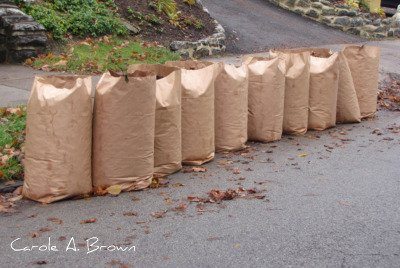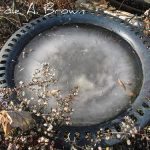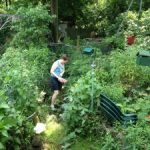It’s happening early this year, maybe because of the drought we had in early summer, or maybe because of the more than 30″ of rain we’ve had since August 1, but there they are those paper bags full of leaves lined up like sentinels along the sidewalk.
If only people knew how many butterfly chrysalides and larva they are throwing away, let alone the salamanders, frogs, and toads who make their home in those leaves!
My ecosystem garden is designed to create welcoming habitat for wildlife; that is its purpose. The beauty of my garden is because so many different birds, butterflies, bees and other critters have chosen to share my space with me. And that means the leaves stay in my garden.
My friend Pat Sutton wrote eloquently about fall garden chores and how our wildlife friends would be much better off if we relaxed these chores a bit. Don’t miss her funny description of the woodland elves dancing around the forest to clean out ponds!
Heather Holm has given us a detailed post about the many kinds of wildlife who make their homes in the leaf litter. Her photographs of these critters are stunning, so go and check them out now. Plus, wouldn’t it be nice if our environment was not filled with the sounds of leaf blowers every fall weekend from now through Thanksgiving?
Kathy Green has also written about tidy wildlife gardens, and given a great series of thought-provoking questions to make wildlife a priority in our gardens. When you think about your answers to each of these questions, you will be able to create more welcoming habitat for wildlife in your garden.
Here are some items to think about before jumping into your Fall garden chores:
Wildlife: Some species of wildlife may be more active in the fall, so it’s important to avoid disturbing them while they are preparing for winter.
Leave Debris: Leaving dead leaves and other debris in the garden provides important habitat for insects, small mammals and birds, so it’s important to avoid removing them.
Soil disturbance: Over-tilling or disturbing the soil too much can disrupt the natural process of decomposition and harm the soil’s structure.
Perennial protection: Some perennials benefit from a protective layer of leaves over the winter, which can help to insulate their roots from cold temperatures.
In general, it’s important to approach fall garden chores in a way that minimizes disturbance to wildlife and the ecosystem.
More From Ecosystem Gardening:
Submit your review | |








